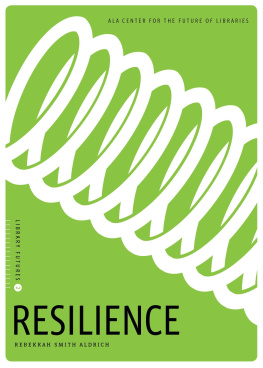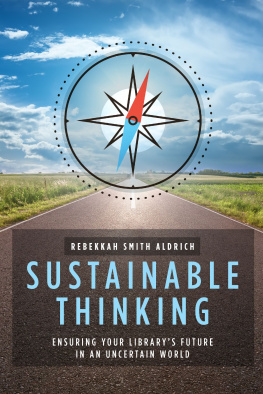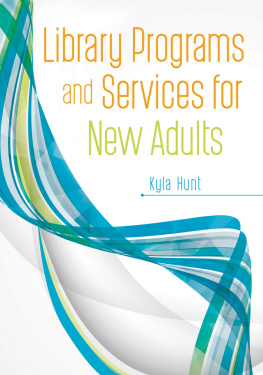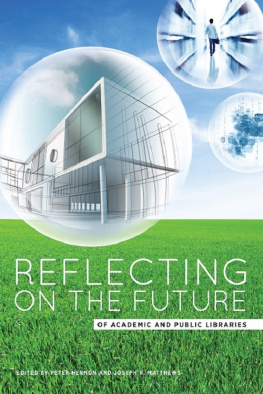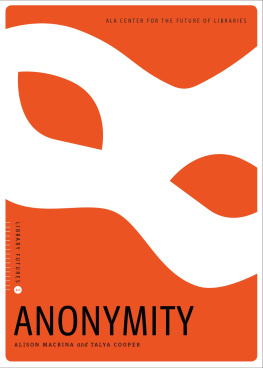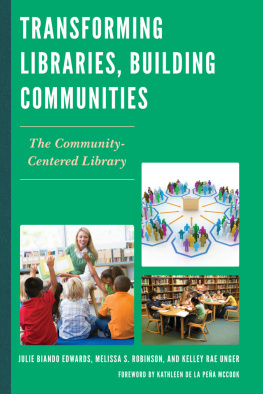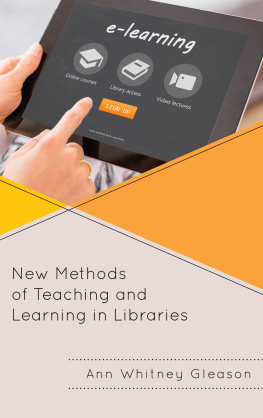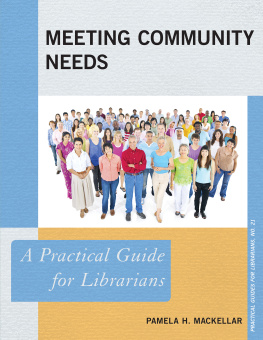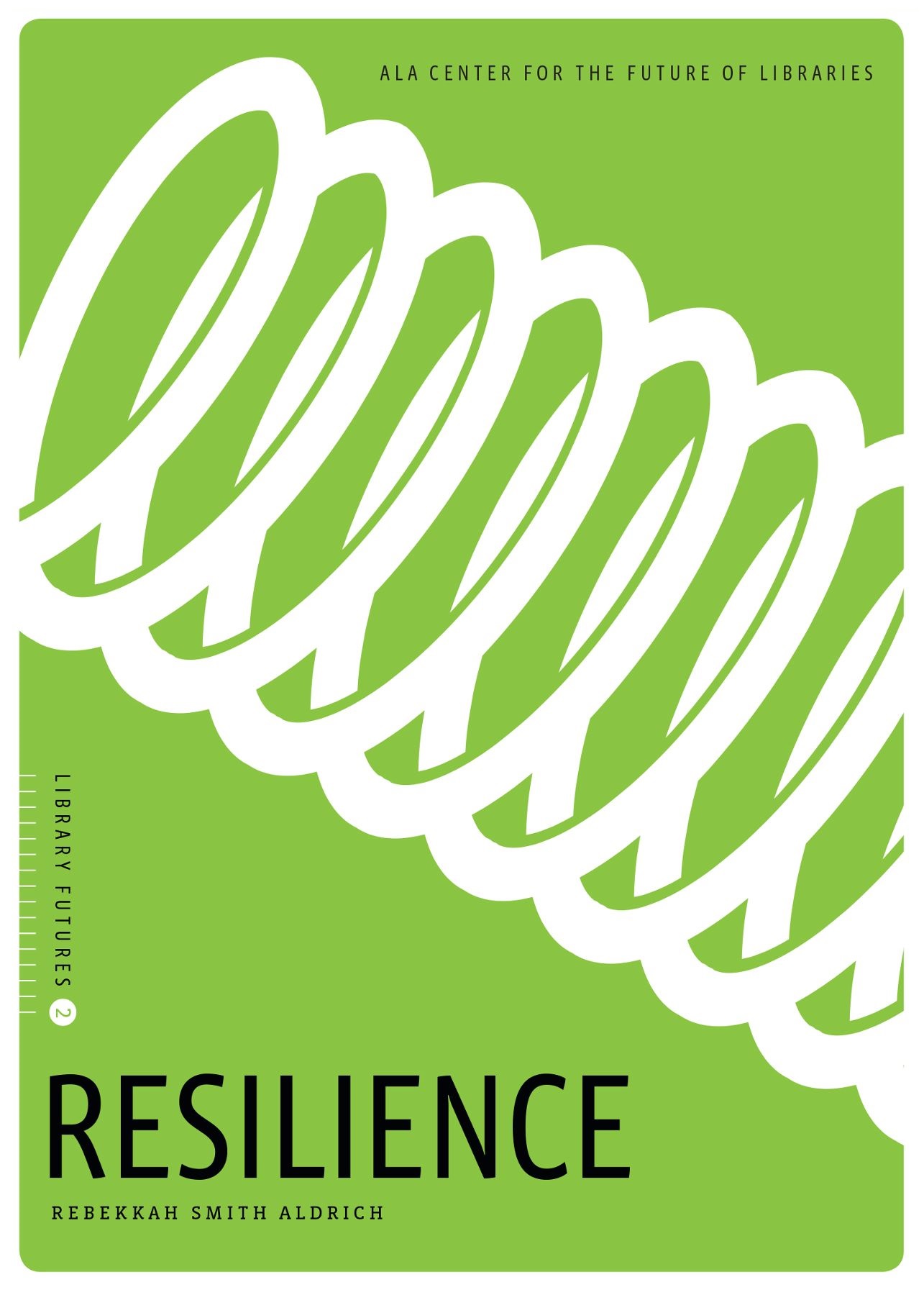
BOOKS IN THE LIBRARY FUTURES SERIES
Resilience, by Rebekkah Smith Aldrich
Anonymity (forthcoming), by Alison Macrina and Talya Cooper
Blockchain (forthcoming), by Susan Alman and Sandra Hirsh
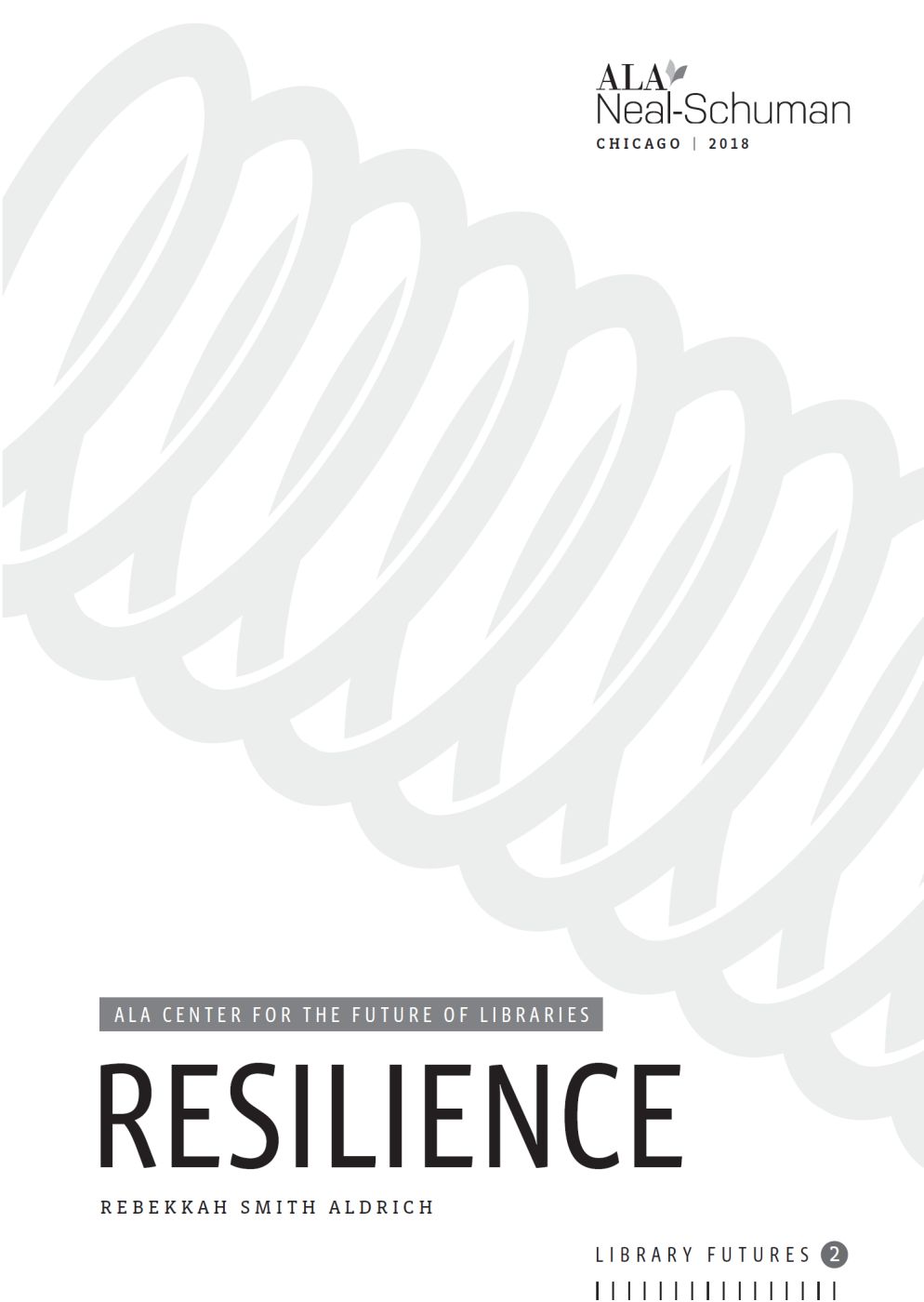
REBEKKAH SMITH ALDRICH is a passionate advocate for public libraries because she knows that libraries can change the world. She currently serves as the coordinator for library sustainability at the Mid-Hudson Library System (New York), where she daily assists sixty-six public libraries in the areas of leadership, funding, and facilities. Aldrich is the sustainability columnist for Library Journal, the author of the Handbook for New Public Library Directors in New York State, coauthor of the Handbook for Public Library Trustees of New York State, and author of Sustainable Thinking from the American Library Association. She was a founding member of both the American Library Associations Sustainability Roundtable and the New York Library Associations Sustainability Initiative. Rebekkah is proud of her work to help pass the 2015 ALA Resolution on the Importance of Sustainable Libraries. Named a Library Journal Mover & Shaker, Aldrich is a frequent national presenter on the topic of leading libraries forward in smart, practical, and effective ways.
2018 by the American Library Association
Extensive effort has gone into ensuring the reliability of the information in this book; however, the publisher makes no warranty, express or implied, with respect to the material contained herein.
ISBNs
978-0-8389-1634-6 (paper)
978-0-8389-1754-1 (PDF)
978-0-8389-1753-4 (ePub)
978-0-8389-1755-8 (Kindle)
Library of Congress Cataloging-in-Publication Data
Names: Aldrich, Rebekkah Smith. | Center for the Future of Libraries.
Title: Resilience / Rebekkah Smith Aldrich.
Description: Chicago : ALA Neal-Schuman, an imprint of the American Library Association, 2018. | Series: Library Futures series | At head of title: Center for the Future of Libraries.
Identifiers: LCCN 2018009907 | ISBN 9780838916346 (print : alk. paper) | ISBN 9780838917534 (epub : alk. paper) | ISBN 9780838917541 (pdf : alk. paper) | ISBN 9780838917558 (kindle : alk. paper)
Subjects: LCSH: Libraries and community. | Libraries and society. | Library planning. | Emergency managementPlanning. | Sustainability. | Libraries and communityUnited StatesCase studies.
Classification: LCC Z716.4 A445 2018 | DDC 021.2dc23 LC record available at https://lccn.loc.gov/2018009907
Cover design by Kimberly Thornton.
ALA Neal-Schuman purchases fund advocacy, awareness, and accreditation programs for library professionals worldwide.
CONTENTS
BY MIGUEL A. FIGUEROA
Center for the Future of Libraries
American Library Association
Resilience has become one of those words applied expediently as a salve for any one of a number of issues in todays society. Students and children need to develop grit and resilience to succeed in an increasingly competitive environment. Displaced communities are praised for their resilience as neighborhoods flood and electrical grids fail. Employees need to be resilient to changing demands and reduced resources.
If todays concept of resilience often seems to shift the burden to the individual or creates a top-down approach, how does it fit into a profession like librarianship whose past and future are testament to the collective powers of community?
In Resilience, Rebekkah Smith Aldrich re-centers the concept to show its alignment with our professions values and its usefulness for guiding our future roles in communities. In these times of disruption and change, a more reflective understanding of resilience inspires us to think more deeply about our enduring work and our commitment to diversity, education, engagement, equitable access, preservation, service to the public good, and social responsibility. It also provides us with a new framework for achieving these goals with greater urgency and efficiency.
Rebekkah begins by demonstrating how resilience has become a central trend in a world of disruptions. To the excellent sources she references, I will highlight the work of UN-Habitat, the United Nations program that promotes socially and environmentally sustainable development and the achievement of adequate shelter for all. UN-Habitat identifies resilience as a key theme in the pursuit of better urban futures and defines it as the ability of human settlements to withstand and to recover quickly from any plausible hazards... not only... reducing risks and damage from
Rebekkahs compelling vision outlined in Resilience in Libraries roots our resilience work in our role as community conveners, bringing people together with information, with each other, and with other organizations and institutions. She helps us see that libraries can restore a vision for resilience that empowers the individual and the collective.
From the Field considers how a resilience strategy aligns with what truly great libraries have done and will continue to do. Rebekkah looks at libraries resilience strategies in response to disruptions, in the planning of our buildings and services, in our engagement with communities, and in our roles as educators, preparing individuals with the skills to live their best lives.
In For the Future, Rebekkah points to the urgent need for resilience strategies in our communities and the ways that libraries can work to not only make our own organizations resilient to disruptions, but also to create a system of resilience that benefits all members of the community.
Because of Rebekkahs workand the work of colleagues across our profession, including the American Library Associations Sustainability Roundtable Reading Resilience, I am recommitted to the ways that resilience, pursuing an inclusive framework for responding to disruption and empowering all members of a community, aligns with our professional values and the usefulness it can have for shaping the future of libraries.
We live in uncertain times.
Uncertainty on many frontspolitical, economic, technological, environmentalconfronts our everyday lives and our planning for the future. With increased access to data, news, and opinion, the variations on the themes of our day are complicated, often obscuring our path forward as communities. As a community leader, cultivating a clear vision for the future must take into account the need for increased resiliency.
Resilience, by definition, is a capacity that enables people, places, and systems to survive, adapt, and thrive. Resilience is multifaceted: it can refer to infrastructure, individuals, environmental or economic systems, and organizations.
Resilience can be naturally built in (as in healthy ecosystems) or be deliberately developed (as in sustainable building designs). In an increasingly complex and interconnected world, we are in the race of our lives to plan further and further ahead as the severity and frequency of environmental, social, and economic disruptions continue to intensify.
It is easy to have blinders on. It is easy to focus on immediate issues of concern, such as the price of e-books, the challenges of managing new staff who are from a different generation than yours, the difficulties associated with being managed by someone from a different generation than yours, or the fact that the air conditioning on the second floor of the library doesnt ever seem to work right. It is challenging to keep our eyes focused on what is going on around us, outside the library, and to
Next page
